The results from the 2014 European Parliament elections have come in. Most of the media is describing it as an ‘earthquake’. Not only has there been a significant shift in voting patterns, but many successful parties can be described as ‘extreme’. Far-right and eurosceptic parties have done extremely well, whilst ‘establishment’ parties have either seen their support collapse or stagnate.
There are two big stories that stand out. In the UK, the eurosceptic nationalist UK Independence Party (UKIP) came first with 28% of the vote. This was an increase of 10% from the previous elections in 2009. It was also the first time in modern history that a party other than the Conservative Party or Labour Party won a national election.
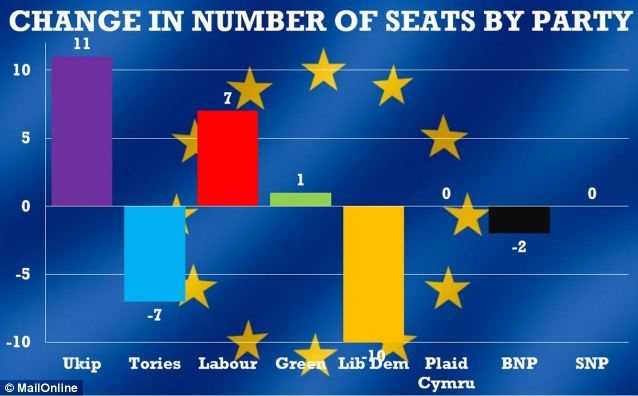
In France, the far-right Front National topped polls with 25% of the vote. This is quadruple what they got in 2009. Led by Marine Le Pen, daughter of founder and Holocaust denier Jean-Marie Le Pen, this party is basically the poster-boy for ‘polished fascism’. Under Marine’s leadership, they have become more acceptable, and quasi-credible, than they were under her father (who described Nazi gas chambers as a “small detail”). Instead of classic racism, they use dog-whistle language of anti-Islam and anti-immigration. But, at heart, they are still effectively an extreme nationalist party.
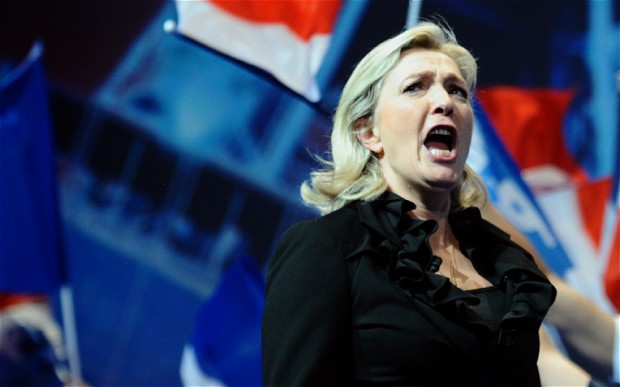
The term fascist needs to be used carefully. It is tempting to call anything you don’t like ‘fascist’. This only perverts the language of political discourse, as fascism does and should mean something very specific. Some on the left call anything they deem ‘far’ right to be fascist, whilst some on the libertarian right call anything that looks vaguely authoritarian or socialist fascism. No matter how much you hate them, and no matter how vindicated you may be, neither Margaret Thatcher nor Barrack Obama were/are fascists. And neither are UKIP, nor, indeed, are many right-wing nationalist parties across Europe.
I am not emphasising this point because of any affinity or sympathy towards UKIP. Quite the opposite. Although they have called themselves libertarians, and their euroscepticism and quasi-pro-market rhetoric can seem appealing, this is pure sophistry. Their stances on social policy and immigration are strongly authoritarian. And whilst they use democratic and libertarian sounding rhetoric to express their euroscepticism, it is pretty easy to detect the ugly, parochial Little Englander cultural-nationalist sentiment and mentality underneath it all.
However, it is important to remember that they are not (all) racist. And, at the very least, using this kind of accusatory rhetoric has, from what I can see, actually served to help the party and to drive more people towards them. Without knowing as much about the political culture in other European countries, I feel less confident in extending this judgement. But, at least intuitively, it would make a lot of sense.
In contrast some of the parties most certainly are fascists in a technical sense. The notorious Golden Dawn managed to win representation in Greece. And then there’s Jobbik in Hungary. Who actually want to register people’s Jewish ancestry. Being careful with criticism and terminology is important because the rise of UKIP represents something quite different from the rise of Jobbik, and they have to combated in different ways. Plus, simply tarnishing them with the same brush could have the result of making the true far-right seem legitimised by association with the simply reactionary and populist right.

In light of these results and, perhaps more importantly, what seem to be their causes and their likely affects, here are some suggestions for how you should think about and respond to the current political climate in Europe.
This happened for a reason
This may seem like an obvious point, but it should still be emphasised. People did not vote for parties like UKIP without reason. Different narratives are already being spun. People may be employing a protest vote against what they perceive as the establishment - whether that’s mainstream domestic parties or the inaccessible and incompetent bureaucratic monolith that is the increasingly federalised EU itself. People have been duped. Either they’re simply stupid and don’t understand what these parties stand for, or they’ve been manipulated by a media that over represents the importance of the populist right, and has presented them as more credible and more anti-establishment than they really are. Or people genuinely support the views the party expresses. This may be the ‘actual’ message, or the purported ‘dog-whistle’ message. Maybe people are, rightly or wrongly, generally concerned about ‘out of control’ immigration. Or maybe they’re just racist.
It should be obvious that there is a grain of truth in all of these perspectives. Some UKIP voters are concerned about the EU’s purported ability to shape UK law. Others may by Little England fetishists. Some are simply employing a protest vote. Others may have a distorted view of their actual policies. And some may be racists.
Opposition must be nuanced and intelligent
I think that it is increasingly clear that parties like UKIP are doing well precisely because they have been treated condescendingly and/or with aggression. There are a couple of reasons why. Firstly, dismissing them as “fruitcakes” and “loonies”, or as “racists”, doesn’t work if people sympathise with what they’re saying. It actually makes them more appealing for people who feel their views have been marginalised. And, it adds to the notion that they are a populist insurgency dismissed and suppressed by liberal elites. The same can be said about aggressive protesting. It just makes them look reasonable when they’re contrasted with chanting, placard waving idiots. And, if you sympathise already, being called “racist scum” by an angry student yelling in your face, you’re unlikely to change your mind.
Secondly, opposition to the ‘far-right’ has been clumsy because people seem unaware of, or unwilling to admit, some pretty important distinctions. The term ‘far-right’ is pretty vague and confused as it is. If ‘right-wing’ is understood as full-throttle neo-liberal capitalism, then most of the far-right would actually qualify as pretty left-wing. Of course, the terms aren’t as simple as that, but the point is that the left-right spectrum is pretty confused as it is. With regards to far-right parties (as the term is generally used) they are pretty diverse. The Telegraph did a nice job of describing three distinct types: populist right, standard far-right, and extreme far-right. Still, this misses some nuance.
At any rate, I’m still just getting at the fact that calling UKIP fascists and/or racist is not just unproductive, but is inaccurate. Being against immigration is probably a mistake both in economic and in moral terms. And a lot of the cultural arguments (“peoples is speaking in foreigns when they is on our trains!”) are petty and xenophobic. But this is not the same as being an actual racist. Perhaps, as a matter of fact, these views stem from, sit alongside, or contribute to, explicit or implicit racists views or assumptions. But, in themselves, they remain distinct. Ignoring this is problematic, first and foremost, because if you simply dismiss opposition to open borders or multiculturalism as being racist out of hand, you have not bothered to make a positive case for the alternate point of view.
The centre-right must be clever but principled
Attracting voters who have specifically abandoned your party is tricky. Attacking a party that is simultaneously haemorrhaging support, whilst advocating some pretty dire policies, is even trickier. The problem is impossible to ignore, but capitulation looks weak and opportunist. Furthermore, a lot of the things that UKIP voters dislike are popular amongst other voters and, in my humble opinion, have been very positive policies. Gay marriage is one that leaps to mind.
However, I think a possible strategy is pretty clear. The centre-right needs to recognise the concerns of UKIP voters (and not simply dismiss them), make some concessions and policy shifts, but also defend their record and refuse to capitulate on certain issues. Moving to a tougher ‘negotiating’ stance on Europe is something of a vain policy, but it shouldn’t do too much harm. Strongly promoting a referendum on EU membership (and viciously attacking the left for refusing to allow one) is a good policy, as is indicating that the debate should be one of conscience (a pro-Europe Conservative Party must allow individual members, and even high profile figures, to campaign for withdrawal).
Importantly, this is especially important for europhile Conservatives. Of course, all europhiles should support a referendum and actively make the case whilst dropping their arrogant condescension about people making the ‘wrong’ choice. And it opens the door for a more reformist and activist role within Europe in general. But allowing and facilitating this debate could foster a new centre-right position on Europe that makes up for the incoherence, in-fighting and extremism that has defined the Conservative Party’s relationship with Europe for the past generation.
By shifting on Europe, the centre-right can also avoid making some very ugly concessions on social policy. Gay marriage was a significant victory in its own right. But it is also valuable as an indication that right wing (and, most importantly, conservative) can be socially liberal and change with experience. It is perhaps unavoidable that immigration will remain a big issue (although, maybe not). And maybe the centre-right and centre-left need to be seen to be doing something about it. But, at the same time, they can take the bolder step of shifting the debate. The positive case for why immigration is directly beneficial for a country and economy needs to be made - ideally by people on the right.
Likewise, the nonsense about job stealing and welfare tourism should be addressed. Admittedly, the average voter probably won’t be won round by a list of facts. But, the emphasis of the debate and narrative can shift. Emphasise what we gain from being an open country. Champion immigration on pragmatic grounds. Make the positive (but non-radical) case for the benefits of a more tolerant and liberal society. In other words, address the concerns of UKIP voters by challenging them with language they understand.
The results are not that significant
The media have called UKIP’s success an ‘earthquake’. There are plenty of headlines about swings to the right. And lots of commentary on how this reflects deep dissatisfaction with the EU and its political leadership. And, sure, the results are not irrelevant. They are pretty dramatic and they do reflect something of the political climate. But, it’s easy to exaggerate this.
Firstly, the European Parliament itself is pretty insignificant. It’s powers and responsibilities are pretty limited. The real power in Europe lies with the commission and its power to initiate laws. The Parliament is just a scrutinising and rubber-stamping body, mostly there to pay lip service to the idea that the EU is as much about democracy as it is about federalism (hint: it’s not). So, the constituency of its members is not all that important.
Secondly, the results are not that dramatic. Sure, UKIP and Front National came first in their respective countries. But each still received less than 30% of the votes cast. On a pretty small turnout. Importantly, most ‘radical’ voters did choose to vote. The sort of person who forgets to vote in an EU election but then does vote in a General Election is probably the sort of person who always votes Conservative or Labour. Likewise, a lot of people will have voted more extremely than normal because it is an unimportant election. They’re more likely to play it safer (ideologically and tactically) come General Election time.
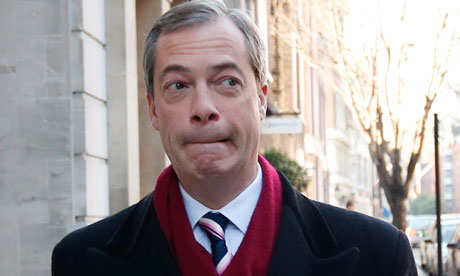
So these results probably do not reflect the results of a General Election. Further, a momentary explosion of feelings does not imply that the political landscape is permanently changed. Take the Tea Party and Occupy Wall Street. They did have an impact on mainstream US politics, but much less of one than could have been extrapolated from their ‘honeymoon’ periods. Certainly the scale of their original protests has pretty much fizzled away.
It’s also worth remembering that good things could actually come of this. Increased likelihood of a referendum is a good thing, as is the need for europhiles and advocates of immigration to make positive cases for their views rather than just dismiss their opponents as stupid or racist. And the presence of strong opinions on one side of an issue can push people on the other side of the debate to strengthen their own hand. Maybe, just maybe, UKIP’s victory could facilitate articulation of how the UK’s current immigration system is far from being excessively lax, but is actually horrifically draconian.
And, most importantly, the rise of UKIP has actually ensured the demise of the much uglier BNP. Nick Griffin thankfully lost his seat, and the BNP have pretty much collapsed as any significant force. This represents something important. Whilst UKIP are xenophobic and reactionary, they are not outright racists. And I think the same can be said for a lot of the voters who jumped to them from the BNP. Their views leave a lot to be desired. But if this soft-core nationalism can be detached from enabling the hardcore *actually fascist* version, then I’d be happy to call that progress.
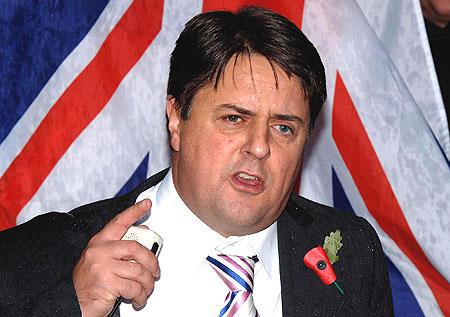
A better vision of euroscepticism must be articulated
This should be a given, really. The current parameters of the debate (nationalist vs. federalist) is entirely unacceptable and ludicrous. Libertarians, in particular, should find this dire and pathetic. The left also need to make their own opposition to the EU clearer and better defined. Sure, the Green Party and other aspects of both the libertarian-left and the far-left have made these cases. But it needs to be pushed more aggressively as an alternate vision to the options of isolationism and capitulation to a clumsy and corrupt bureaucratic monolith.
The fate of the German AFD is also interesting. Initially founded as a eurosceptic economically market liberal party, they have faced extreme difficulties in avoiding populism, crude nationalism, and far-right tendencies. Initially it was simply difficult for them to avoid being tarnished by association with media stereotypes of right wingers. Opposing the Euro apparently equates with racism. More recently, the worst battles have been internal. The founders, mainly academics, have tried to keep the party sane. But the influx of members have ensured that they veer increasingly into anti-immigration, pro-isolationism territory.
It needs to be easier to be a liberal or libertarian eurosceptic who supports internationalism and open borders.
The rise of the far-left is also significant
The eagle-eyed reader will notice I have neglected to talk about the gains made by far-left parties. This is simply a reflection of the media/popular response to the election, and a judgement on what is most likely to have the furthest reaching effects. Whilst The Guardian has run a piece of the general gains of the Left in these elections, I don’t think it is particularly interesting that the Portuguese centre-left opposition out polled the centre-right government. That is simply business as usual.
However, some left-wing gains are interesting. And worrying. Syriza in Greece are particularly noteworthy. Whilst they are generally pro-EU, their long-run goal is to renegotiate Greece’s relationship with the rest of the Eurozone so that, basically, Greece gets given lots of bailout money with absolutely no conditions or costs. If they were to end up in government the likely result would be Greece being kicked out of the Euro for refusing to play ball (and then running off with the ball and demanding to be made team captain despite being really shit at everything).
Syriza are primarily interesting not for their own policies. Rather, they demonstrate a worrying model for a popular left to follow. Namely, one that pays no heed to reality and instead trumpets pure fantastical ideology with no concern for economics and no consideration of unforeseen consequences. Their success may prove to be a worrying example.
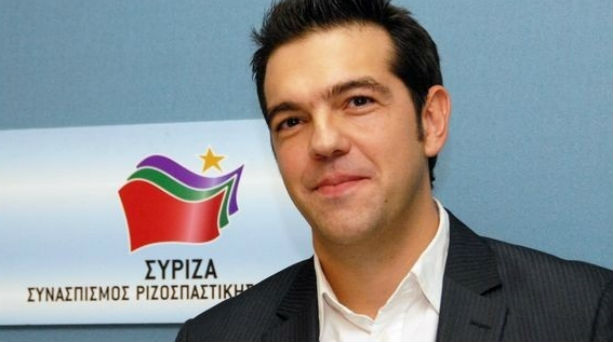
Internal party politics can wait
After every setback, major or minor, there is media speculation that a political party will axe its leader. Right now, this has been thrown at all three major party leaders in the UK. The Greens seem to above such pettiness, whilst the BNP are now irrelevant. But for the official opposition and the parties of government, the usual knee-jerk reaction to failure has kicked in. I do not think anything will come of it, but it is worth considering.
When you’re one year shy of a General Election, engaging in a leadership cull is a bad idea. It is something of a premature and excessive response - rather like firing a CEO for a single bad quarter of profit. Waiting for the more significant and testing General Election is wiser. Parties don’t have the time or the conditions for a radical overhaul of their stance and image in this short time. Contrastingly, the aftermath of a General Election and the full term of a new Parliament gives the chance for a complete break with the past and a convincingly new direction.
The Liberal Democrats will be unable to retain Clegg following a General Election wipe out. And a wipe out is pretty much guaranteed. But it would be utterly disingenuous for any lead Lib Dem politician to take the helm now and claim any additional credibility. Even if that were viable, they would be unlikely to receive much thanks for pulling the plug on the coalition at this late stage - either you think the worst damage has already been done, or you’re invested in one more year of stability. A new parliament and a new leader would be a good response following election defeat. They can then make the case of having learnt from government - or return to being a protest party, having culled all the guilty collaborators.
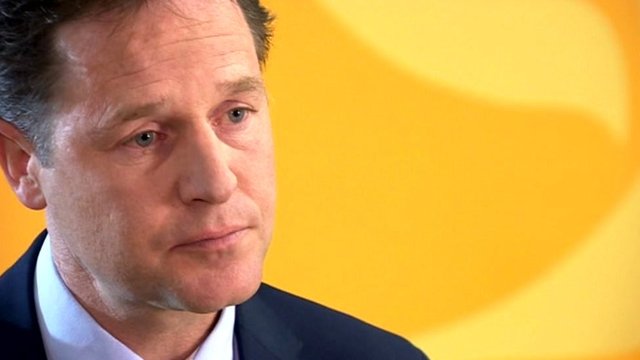
Similarly, either Cameron or Miliband is facing removal following an election defeat. Many Labour MPs (and everyone with eyes and ears) are increasingly aware that Miliband is simply unfit to lead a circus, let alone a political party. But, again, there is no time for a new leader to rally the party around a single purpose and make it into a functioning election machine. This is not to mention the need for Labour to formulate some (any…) policies.
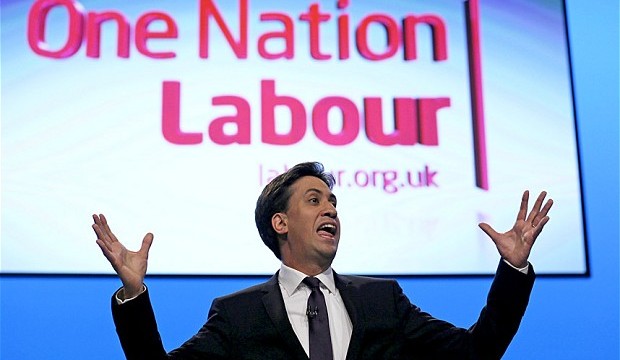
As for the Tories, although many right-wingers have been desperate for Cameron’s head ever since they first saw his smarmy grin, they are better off waiting for him to be booted out by the country. A new convincing and principled leader could then take over, and have the space to embrace some of the coalition’s legacy, whilst disregarding the rest.

[…] the alarm – just hearing it galvanizes their followers and confirms them in the knowledge that anyone to their right is a racist homophobic misogynist with a secret yen for World War II memorabilia. Their big blind […]
[…] the present political climate in Europe, these issues are as important as ever. Although Stanhope is talking about the USA, it is […]
[…] 3D i deputati europei che servivano per fare il gruppo autonomo… Ultraliberista non saprei… http://the-libertarian.co.uk/thoughts-eu-elections/ Non mi chiedermi di coniugarti i verbi, non li so. Se li avrei saputi mo' te l'imparavo. […]
[…] the alarm – just hearing it galvanizes their followers and confirms them in the knowledge that anyone to their right is a racist homophobic misogynist with a secret yen for World War II memorabilia. Their big blind […]